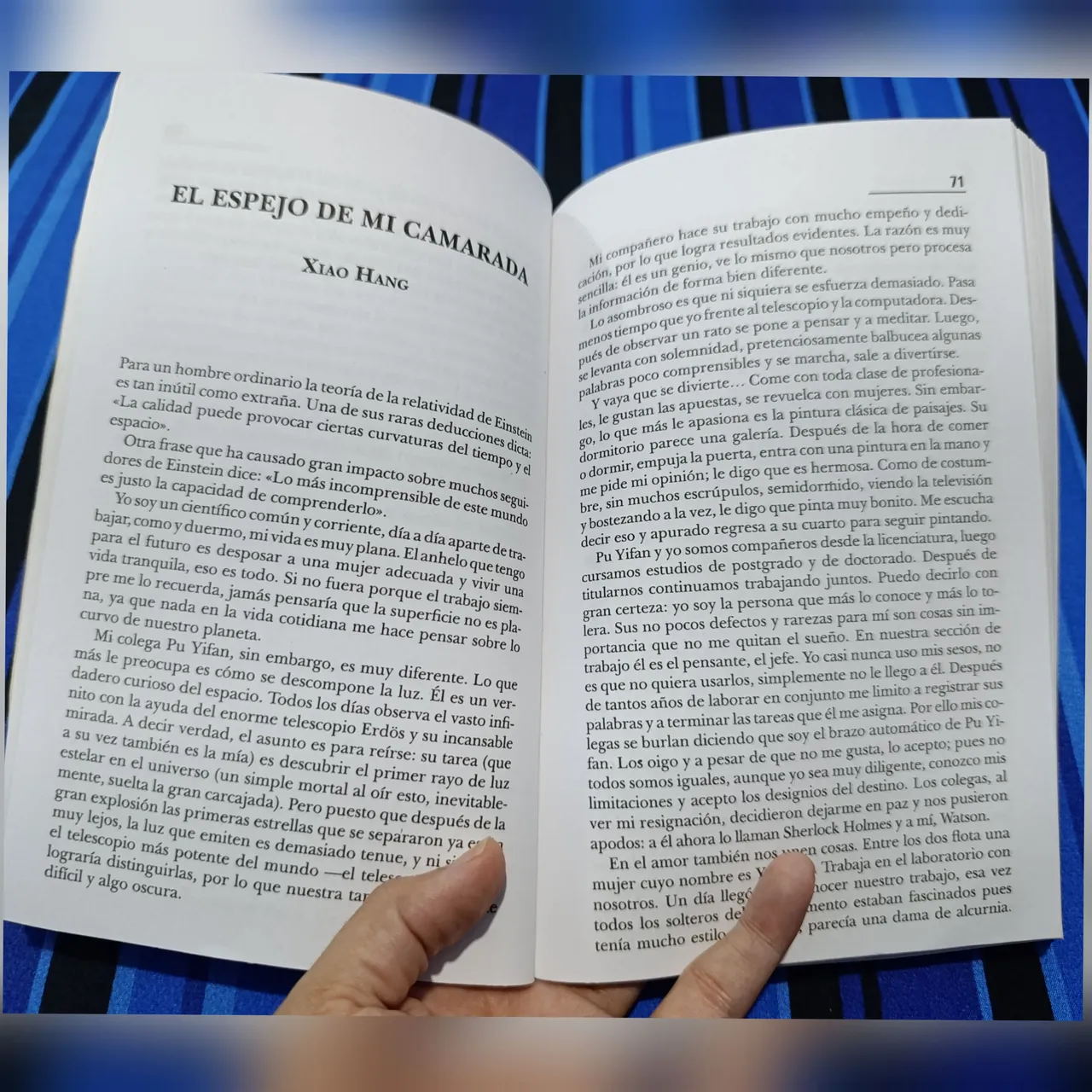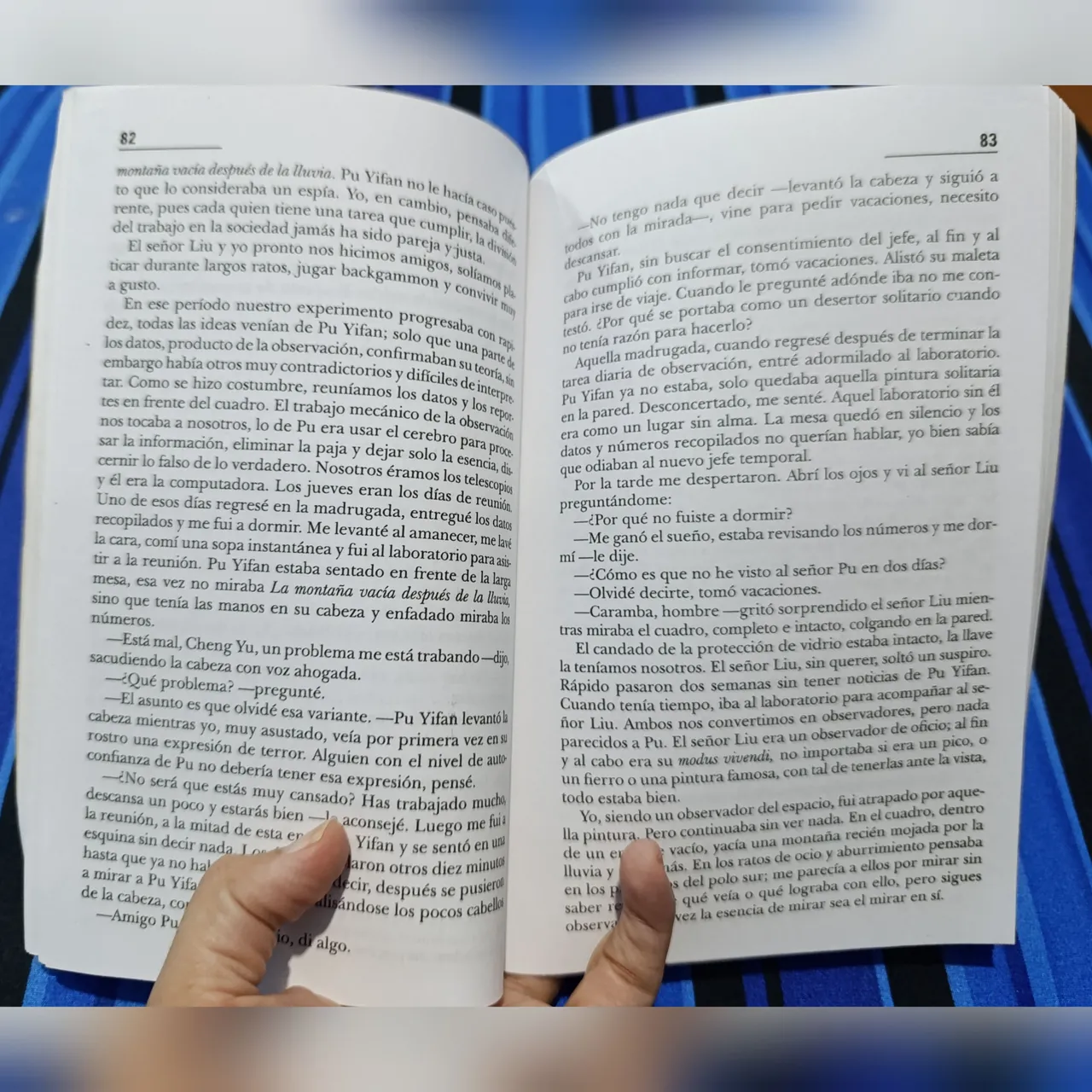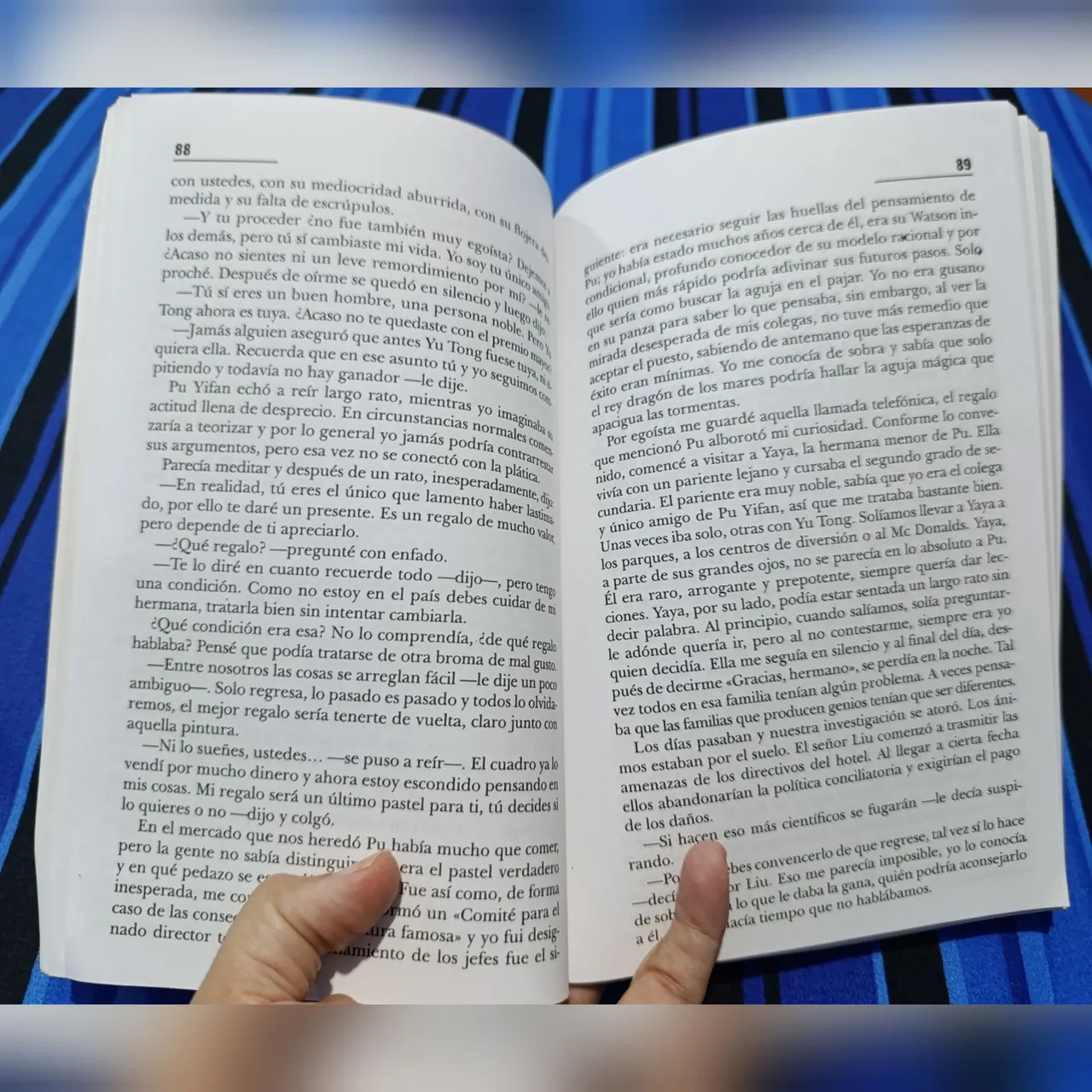The Mirror of My Comrade by Xiao Hang is a novel that immerses us in very interesting plots since one of them is based on the scientific universe that is built around astrophysics. Here we will find different theories and postulates about outer space and the decomposition of light, theses that rest under the fictional project "Looking at the stars", which is influenced by authentic postulates of Albert Einstein, because Hang, in addition to literature, is passionate about scientific research.
In the novel, the protagonist is Pu Yifan, a genius who leads a group of astronomers, whose mission is to discover the first ray of starlight. However, he also possesses remarkable artistic skills as a painter. The light-hearted personality of this character is noticeable as he is described as a braggart, womanizer, gambler and party animal. On the other hand, Cheng Yu, who is primarily a secondary character, a scientist and Pu Yifan's close friend, assumes the narrative focus of this story.

Several passages highlight the laziness and parasitic condition of the group of fifty scientists under Pu Yifan, who leads the project but observes that no one is able to refute his theories to move in any alternative direction, yet they remain on board to collect their salaries without making any effort. This situation sparks outrage in Pu Yifan, who executes an elaborate escape plan that involves stealing and trading a valuable painting, the most ironic part of the matter is that the fifty scientists participate in the plan without knowing it.
Yu Tong is the female figure for whom the two protagonists show interest. My attention was drawn to the thoughts of the narrator-character, who does not mind being his friend's replacement neither in work nor in love, since he was never seen as that woman's first choice being a subordinate of Pu Yifan, yet she agrees to share her life with him when the main protagonist leaves the scene.

It is evident that the novel presents the mirror theory, a resource used in literature whose starting point is psychoanalysis and sociology. Cheng Yu's identity is constructed through his perception of Pu Yifan, his memory begins to fade precisely when he escapes from his work taking with him the painting "The Empty Mountain after the Rain", which has a real reference and is inspired by a poem by Wang Wei that deals with silence and absence from the postulates of Taoism and Zen philosophy.
When Pu Yifan becomes a genius without memory, a product of premature Alzheimer's, Chang Yu emerges and assumes his position, even awakening in him a fervent passion for art that he did not show before. Pu Yifan, in the midst of his sporadic appearances after fleeing, exhibits a transformation as he leaves behind his arrogance and invests his days in helping his friend to complete the project and also, after selling the original painting, to secure his sister's future, even though the money is the product of a crime.

The novel is undoubtedly very interesting for its plot twists, the mirror effect is presented on several occasions to probe the reader's sagacity and make him doubt. A mirror intervenes to propitiate the discovery of cosmic light whose theory stems from an investigation by Einstein, also Pu Yifan was able to reproduce three copies of the original painting "The empty mountain after the rain", deceiving the most respected art experts in China, so the uncertainty remains as to where the original is.
As can be seen, this narrative proposal from China has all the elements to keep the reader's interest until the end, until the limit of the plan established by Pu Yifan, or perhaps by Chang Yu, is deduced.
Versión en Español
El espejo de mi camarada de Xiao Hang es una novela que nos sumerge en tramas muy interesantes ya que una de ellas se sustenta sobre el universo científico que se construye alrededor de la astrofísica. Acá encontraremos diferentes teorías y postulados sobre el espacio exterior y la descomposición de la luz, tesis que reposan bajo el proyecto ficticio "Mirando las estrellas", que es influenciado por postulados auténticos de Albert Einstein, debido a que Hang, además de la literatura es un apasionado de la investigación científica.
En la novela, el protagonista es Pu Yifan, un genio que encabeza a un grupo de astrónomos, cuya misión es descubrir el primer rayo de luz estelar. Sin embargo, también posee notables habilidades artísticas como pintor. Se advierte la personalidad desenfadada de este personaje ya que es descrito como fanfarrón, mujeriego, apostador y fiestero. Por otra parte, Cheng Yu, quien en primera instancia es un personaje secundario, científico y amigo muy cercano de Pu Yifan, asume el foco narrativo de esta historia.

En varios pasajes se resalta la pereza y la condición parasitaria del grupo de cincuenta científicos a cargo de Pu Yifan, quien dirige el proyecto pero observa que nadie es capaz de refutar sus teorías para avanzar en alguna dirección alternativa, sin embargo, permanecen a bordo para cobrar sus sueldos sin esforzarse. Esta situación desata la indignación en Pu Yifan, quien ejecuta un elaborado plan de fuga que involucra robar y negociar una valiosa pintura, lo más irónico del asunto es que los cincuenta científicos participan en el plan sin saberlo.
Yu Tong es la figura femenina por la cual muestran interés los dos protagonistas. Llamó mi atención el pensamiento del narrador-personaje, a quien no le molesta ser el reemplazo de su amigo ni en el trabajo ni en el amor, puesto que nunca fue visto como la primera opción de esa mujer al ser un subordinado de Pu Yifan, sin embargo, ella accede a compartir su vida con él cuando el protagonista principal sale de la escena.

Es evidente que la novela presenta la teoría del espejo, recurso utilizado en la literatura cuyo punto de partida es el psicoanálisis y la sociología. La identidad de Cheng Yu se construye a través de su percepción de Pu Yifan, su memoria comienza a borrarse justamente cuando escapa de su trabajo llevándose la pintura "La montaña vacía después de la lluvia", la cual tiene un referente real y está inspirada en un poema de Wang Wei que aborda el silencio y la ausencia desde los postulados del Taoísmo y la filosofía Zen.
Cuando Pu Yifan pasa a ser un genio sin memoria, producto de un Alzheimer prematuro, emerge Chang Yu y asume su posición, inclusive se despierta en él una ferviente pasión por el arte que antes no demostraba. Pu Yifan, en medio de sus esporádicas apariciones luego de huir, exhibe una transformación ya que deja atrás la arrogancia e invierte los días en contribuir con su amigo para que culmine el proyecto y también, luego de vender la pintura original, asegurar el futuro de su hermana, aunque el dinero sea producto de un delito.

La novela sin duda resulta muy interesante por sus giros de trama, el efecto espejo se presenta en varias ocasiones para indagar en la sagacidad del lector y hacerle dudar. Un espejo interviene para propiciar el descubrimiento de la luz cósmica cuya teoría se desprende de una investigación de Einstein, también Pu Yifan fue capaz de reproducir tres copias de la pintura original "La montaña vacía después de la lluvia", engañando a los más respetados peritos en arte de China, así que permanece la incertidumbre acerca de dónde está la original.
Como se advierte, esta propuesta narrativa procedente de China posee todos los elementos para mantener el interés del lector hasta el final, hasta deducir el límite del plan establecido por Pu Yifan, o tal vez por Chang Yu.
✓Photos from my personal gallery, edited with Fotocollage.
✓Text translated with DeepL.
✓Fotos de mi galería personal, editadas con Fotocollage.
✓Texto traducido con DeepL.